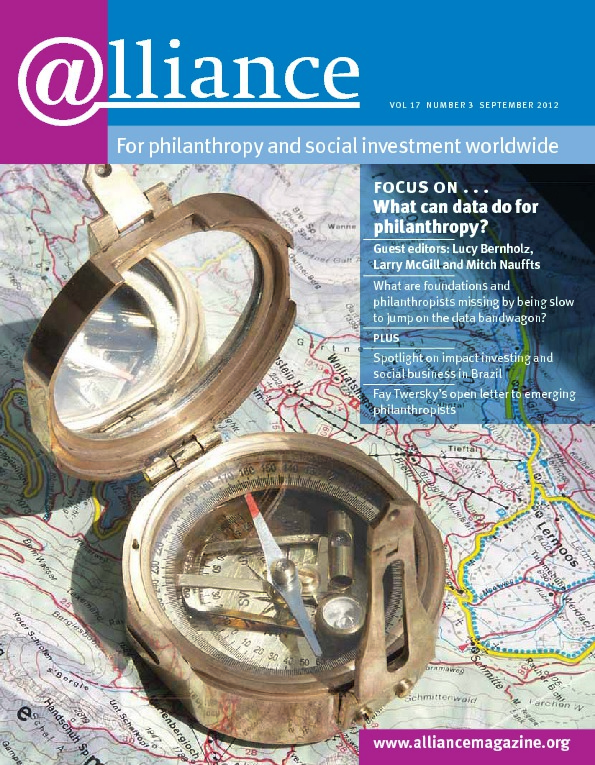As the ‘next gen’ successor to capital markets focused on a single bottom line, impact investing is at a fascinating juncture. The loss of confidence in banks and mainstream investments appears to be with us for the long term, given continued macroeconomic turbulence, and this has led to the strengthening of a fundamental demand for investment alternatives – a demand that is further fuelled by deep-seated worries about the environmental and social trajectory of the planet and the perceived inability of governments to meet social needs. But is the impact investing industry ready to meet the challenge?
The growing demand for alternative investments contrasts with the reality of a fragmented early-stage industry with limited deal flow and little liquidity. Today, many investment intermediaries struggle to cover the real cost of professional due diligence, while sourcing enough good-quality transactions to render a large number of impact investment vehicles viable is a major challenge. Many therefore resort to remedial measures such as cross-subsidizing different business areas and deploying qualified volunteers to help keep costs down.
At Impact Economy, we see a need to completely rethink how public goods are provided. This means innovations in business models. In our view, impact investing will achieve its promise only if we take a more analytical view of the sources of innovation and pursue solutions rigorously with effective partners.
Often, this means building on what others have created. We recently carried out due diligence and valuation of Bio Energy Resources Ltd (BERL) to assess the firm’s impact potential and long-term viability. BERL is a Malawian biofuel company established in 2006 which contracts and trains smallholder farmers to produce jatropha nuts in hedgerows around existing plots of land and process the nuts for fuel. This avoids the fuel vs food trade-offs commonly associated with biofuel production. Over the years, lead investor TNT/PostNL has invested in top-notch logistics, data management and processing plant. To date, BERL has organized 25,000 farmers and planted 6.6 million trees. By 2020, working with over 100,000 smallholder farmers, BERL expects to plant 59 million trees and produce over 11 million litres of jatropha vegetable oil to be turned into bio diesel and 26,000 tons of bio fertilizer annually. Positive social and environmental impacts include relieving the country’s chronic fuel and fertilizer shortage, providing additional income for farmers, achieving greenhouse gas emissions reduction and sequestration (440,000 tCO2e by 2020), and providing training in rural areas.
Developing an analytical view of sources of innovation is also helpful. Both social enterprise networks and the microcosms of business can be an excellent source of ideas. Companies increasingly pursue all sorts of innovative business models, both at the Base of the Pyramid (BOP) and in advanced economies; some can be spun off or replicated as standalone impact investments. Activities associated with embedding sustainability across the supply chain, from raw material sourcing to end-of-life disposal of the product, are also worth looking at.
Entirely new kinds of products and services are another promising area. The shift from physical goods to virtual platforms is already well under way, and promises far-reaching effects, as evidenced by the digitization of the publishing and music industries. In a virtual industry, the marginal cost for environment and society of buying an additional product is negligible, albeit involving a significant initial investment and ongoing energy costs.
One can also create positive social impact via charitable redistribution and branding models, for example taking part of a product’s profit margin and donating it to a cause linked to the product, or donating an item for every product sold, as happens with TOM’s shoes, for example. Moving away from individual ownership of goods to access to shared services is another area where impact businesses could play a profitable and beneficial role. Saying ‘no’ to an investment can also have a positive impact in terms of making sure that impact investment dollars are going to the most effective models, and a project that is not yet ready for investment can look for grants to fund further proof of concept.
We worry about the next chapter in the European debt crisis and what ageing countries with low growth and high unemployment might look like. Impact investing is well suited to back innovative business models and meet unsatisfied needs. The macroeconomic context may throw a few interim challenges our way and lots of details need to be worked out if the industry is to reach its potential. But the moment for investors to zoom in from 10,000 feet and go for impact is now.
Maximilian Martin is founder and chief executive officer of Impact Economy. Email maximilian.martin@impacteconomy.com





Comments (0)